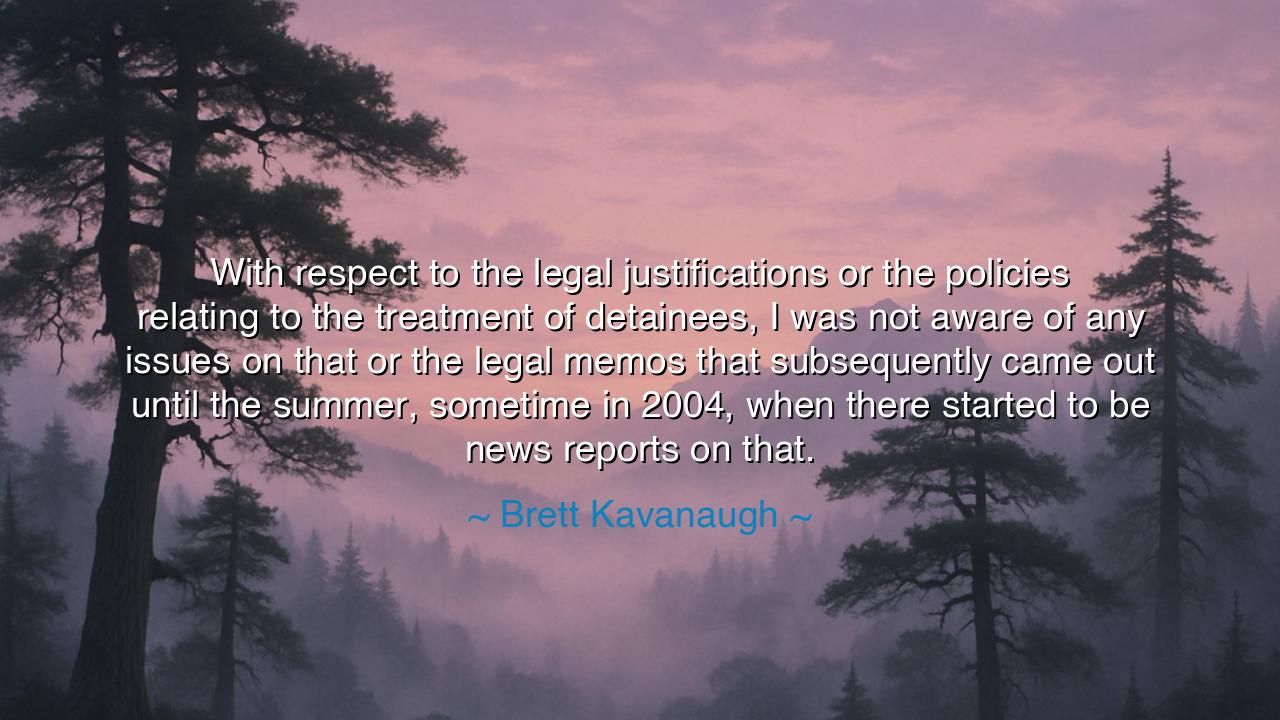
With respect to the legal justifications or the policies relating
With respect to the legal justifications or the policies relating to the treatment of detainees, I was not aware of any issues on that or the legal memos that subsequently came out until the summer, sometime in 2004, when there started to be news reports on that.






"With respect to the legal justifications or the policies relating to the treatment of detainees, I was not aware of any issues on that or the legal memos that subsequently came out until the summer, sometime in 2004, when there started to be news reports on that." Thus spoke Brett Kavanaugh, years later when asked about one of the darkest chapters of America’s modern history. His words reveal not only the intricacies of government service but also the heavy shadow cast by decisions made in secrecy, where questions of law, policy, and conscience collide. In them we hear the uneasy voice of one who sought distance from controversy, yet who lived in the era when such controversies defined the moral compass of a nation.
The origin of this wisdom lies in the years following September 11, 2001, when the world trembled under the weight of fear and vengeance. In that time, governments across the globe—America foremost among them—wrestled with how to treat detainees, men captured in the so-called "War on Terror." It was then that certain legal memos emerged from the shadows of power, justifying practices that many would later denounce as torture. These justifications, cloaked in the authority of law, sought to transform acts of cruelty into instruments of state policy. Kavanaugh, reflecting years later, claimed ignorance of these at the time, learning of them only when the news reports of 2004 brought them into the light.
History has always shown how the hidden policies of states eventually come crashing into the open. Consider the Nuremberg Trials after World War II, when many officials insisted they had not known the full scope of atrocities, or claimed that what was done had been justified by legal reasoning. Yet the world judged otherwise, for there is a law higher than secrecy, and there is justice that outlives the memos of lawyers. So too in Kavanaugh’s words, we see the reminder of how fragile the boundary is between legal justification and moral compromise.
The story of those legal memos—crafted by government lawyers to authorize harsh interrogations—serves as an enduring lesson of how the law may be bent, twisted, and weaponized. To cloak violence in the robes of legality is to betray both law and justice. Kavanaugh’s statement reveals how even within the halls of power, some lived in darkness, unaware of what was being done in the nation’s name, until the flames of revelation burst forth in the public square. It is a testimony to the peril of silence, secrecy, and unquestioned authority.
His words also serve as a warning: that ignorance, whether chosen or genuine, is dangerous when the stakes are human dignity. For what is law if it does not protect the vulnerable? What is policy if it excuses cruelty? And what is leadership if it averts its eyes until the news reports force acknowledgment? The balance between awareness and responsibility lies heavy on every generation, reminding us that to govern blindly is as perilous as to govern cruelly.
The lesson for us is clear: law must never be separated from morality, and policies must never be hidden from the scrutiny of the people. When governments write memos that justify the unjust, the role of citizens, judges, and leaders alike is to question, to demand transparency, and to refuse silence. The failure to do so invites cycles of abuse, where suffering is excused in the name of necessity and cruelty is hidden in the name of security.
What practical steps must we take? Defend transparency in governance, for secrecy is the veil under which injustice thrives. Educate ourselves and others about the difference between legal justification and true justice. Support leaders who value accountability, and resist those who hide behind technicalities to excuse inhumanity. And above all, remember that the treatment of even the least among us—yes, even detainees in distant prisons—reveals the soul of a nation.
So let Brett Kavanaugh’s words, whether of ignorance or caution, remind us: justice cannot survive in silence, and law must not be twisted into a shield for cruelty. The truth will always emerge, for time itself is a judge. And when it does, let it be said that we were not blind, nor silent, but vigilant and courageous in the defense of human dignity.






AAdministratorAdministrator
Welcome, honored guests. Please leave a comment, we will respond soon